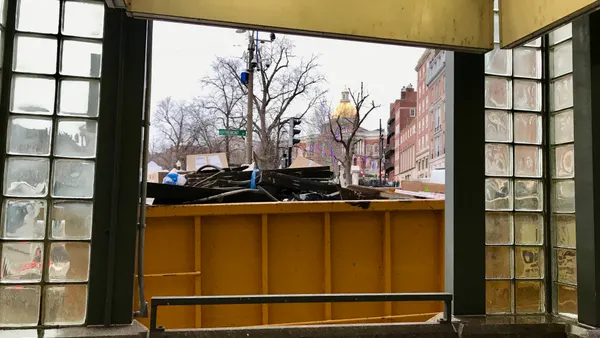Dive Brief:
- Philadelphia has unveiled details of a proposed new processing contract with Waste Management for recyclables managed by the city's Streets Department. The city will pay $90-100 per ton, with incentives for decreasing contamination.
- Philadelphia also will launch an educational campaign to reduce contamination, which was 19.2% in 2017. High contamination levels in certain districts was a key factor in a price hike from Republic Services, which was reportedly requesting up to $170 per ton when factoring in transportation and disposal costs of contamination.
- This new deal will mark the end of Philadelphia sending about half of its recyclables to Covanta for incineration, at $63 per ton, over the past six months. Waste Management was taking the other half, under an interim deal, for a $78 per ton processing cost, reports The Inquirer
Dive Insight:
Philadelphia Mayor John Kenney the new contract will get the city back on track to achieving its goal of "zero waste" by 2035. In 2016, Kenney formed the 16-member Zero Waste and Litter Cabinet to create a plan for diverting more waste and increasing recycling to reach that goal. Since then, city staff have been working on a wide range of initiatives – including a focus on organic waste – to mark progress in that direction.
The city's residential processing contracts had previously been split half-and-half between Waste Management and Republic, but new pricing from the latter company came as a shock to some after years of earning revenue from the program. In 2012, the city was being paid $67 per ton. The increase was reportedly due to changing recycling market conditions, especially as influenced by China's material bans and tighter contamination standard.
The $170 per ton figure often associated with Republic's offer isn't a direct comparison to the new deal with Waste Management, but it does represent a clear example of the company's strategy to increase pricing to cover costs on municipal contracts. During a recent earnings call, executives even said they would be willing to walk away from more municipal deals without the right price.
Philadelphia's educational campaign mirrors efforts in other cities to change residents' behavior through targeted messaging and community outreach. The new Waste Management contract recognizes ongoing challenges related to contamination and offers the city incentives for getting citizens to think more carefully about what they put in their bins – rather than using them as a catch-all. The Streets Department has already distributed recycling bins with lids, along with reusable tote bags to remind people to cut down their use of plastic bags and keep them out of recycling bins.









